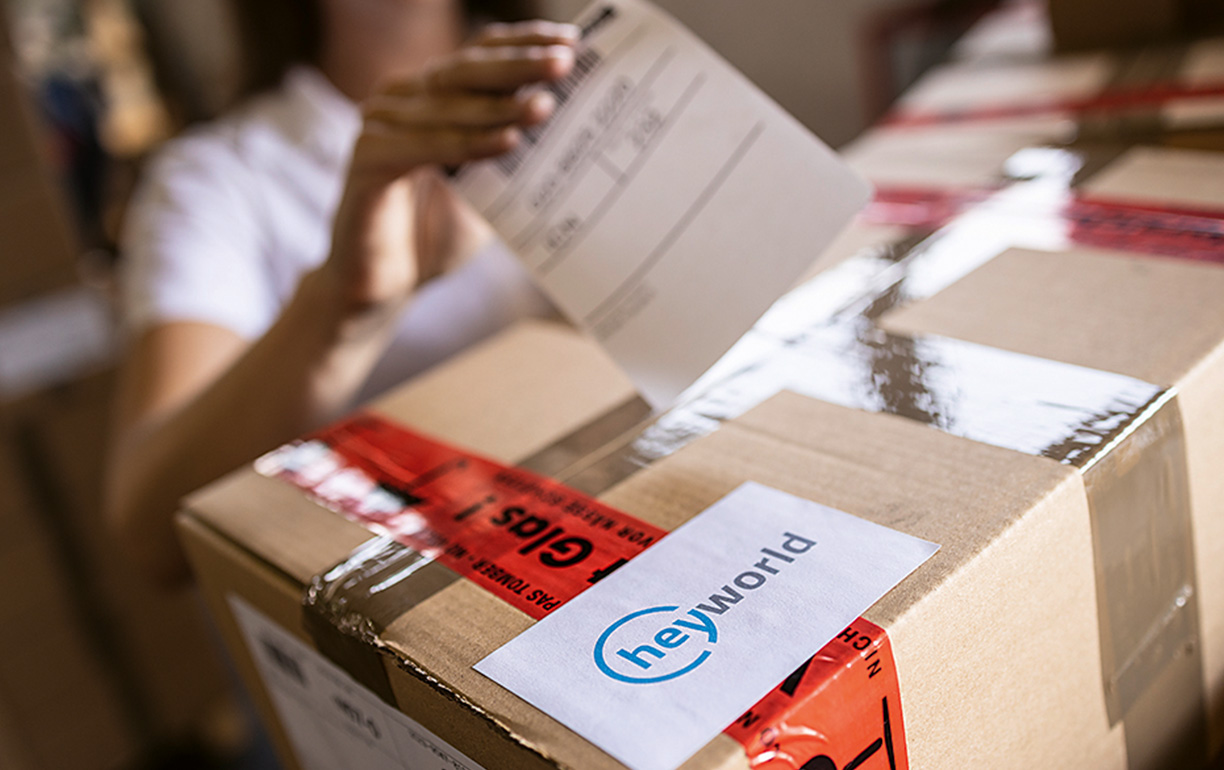
Heyworld.
Timo Schamber belongs to the generation of managers who grew up spending their pocket money shopping on the Internet. “Over time I got used to the ever-increasing level of convenience that comes with players like Amazon offering same-day and flat-rate deliveries. E-commerce is simply the best fit with my lifestyle, because it means I am not confined to the opening hours of brick-and-mortar shops.” Whereas his purchases back then often involved computer games, today the 31-year-old mostly orders fashion articles on the Internet. “Sometimes I order stuff from overseas, because I like items that are difficult to find in my home country, Germany.”
However, Schamber is not only a typical example of today’s consumers, the type who helps generate double-digit growth rates in e-commerce year after year. As the manager of heyworld, he is also deeply ensconced in the sector at a professional level. Since June of this year, this wholly-owned subsidiary of Lufthansa Cargo has been specializing exclusively on the needs of the e-commerce sector. Their services primarily target online merchants, digital marketplaces, webshop providers, but also forwarders who operate in cross-border e-commerce and who want to garner a slice of this ever-increasing “cake” for themselves.
“The services provided by heyworld are more comprehensive than those a cargo airline is able to offer,” is how Timo Schamber explains the rationale behind the company’s inception by Lufthansa Cargo. “To be successful as a logistics service provider in e-commerce, you simply must offer a door-to-door delivery process and be able to flexibly integrate various service providers into a modular transport product.” As an airline spin-off, heyworld will also offer the airport-to-airport module as a key component of its overall solution. Schamber: “This is where our strength tips the balance, because we have access to the best flight network from, to and within Europe. Yet we offer this service as part of packaged combinations, by working in concert with additional partners and integrating e-commerce-specific services such as cross docking.”
However, the main difference to the conventional freight business, and another reason for establishing an independent company, is the fact that e-commerce customers generally want information down to the individual package level, and for the entire door-to-door supply chain – including price information. This has a dramatic effect on the amount of data that needs to be generated, transmitted and processed by the transport management system. Even just tracking an individual package is a much more demanding and complex task than is the case with large single items or with consolidated airfreight shipments. For this reason Schamber readily concedes that in terms of strategy, heyworld probably shares more characteristics with a software company than with a logistics service provider.
Both in terms of pricing and speed, the young company boss perceives his organization to be positioned between the services offered by integrators and those of postal service providers. “In e-commerce, the margins are often quite insubstantial. The cost of express shipments is therefore often incompatible with the budgets available for cross-border expansion of e-commerce merchants,” says Schamber. “However, quality and speed are incredibly important in this market. If you had to wait too long for your parcel to arrive because the logistics service provider was too slow, and maybe could not even tell you when the parcel would be arriving, you are not likely to order again from this same provider. And this precisely is the fact that opens up an opportunity for heyworld. We offer a worldwide, transparent and moderately priced door-to-door service of high quality that also operates at the speed required by e-commerce providers.”
|
“The services provided by heyworld are more comprehensive than those a cargo airline is able to offer,” is how Timo Schamber explains the rationale behind the company’s inception by Lufthansa Cargo. “To be successful as a logistics service provider in e-commerce, you simply must offer a door-to-door delivery process and be able to flexibly integrate various service providers into a modular transport product.” As an airline spin-off, heyworld will also offer the airport-to-airport module as a key component of its overall solution. Schamber: “This is where our strength tips the balance, because we have access to the best flight network from, to and within Europe. Yet we offer this service as part of packaged combinations, by working in concert with additional partners and integrating e-commerce-specific services such as cross docking.” However, the main difference to the conventional freight business, and another reason for establishing an independent company, is the fact that e-commerce customers generally want information down to the individual package level, and for the entire door-to-door supply chain – including price information. This has a dramatic effect on the amount of data that needs to be generated, transmitted and processed by the transport management system. |
Even just tracking an individual package is a much more demanding and complex task than is the case with large single items or with consolidated airfreight shipments. For this reason Schamber readily concedes that in terms of strategy, heyworld probably shares more characteristics with a software company than with a logistics service provider. Both in terms of pricing and speed, the young company boss perceives his organization to be positioned between the services offered by integrators and those of postal service providers. “In e-commerce, the margins are often quite insubstantial. The cost of express shipments is therefore often incompatible with the budgets available for cross-border expansion of e-commerce merchants,” says Schamber. “However, quality and speed are incredibly important in this market. If you had to wait too long for your parcel to arrive because the logistics service provider was too slow, and maybe could not even tell you when the parcel would be arriving, you are not likely to order again from this same provider. And this precisely is the fact that opens up an opportunity for heyworld. We offer a worldwide, transparent and moderately priced door-to-door service of high quality that also operates at the speed required by e-commerce providers.” |

Which is why Schamber is untroubled by the fact that major players like Amazon and Alibaba are increasingly attempting to handle the logistics side of the business themselves, i.e. in-house. Today, just a few months after the company was established, heyworld already does steady business with a number of customers, both within Europe and from Europe to Asia. Product groups particularly suited for e-commerce that the company is already handling or is aiming to handle in the future include fashion articles, shoes, food supplements, electronic equipment and furniture.
The cross-border e-commerce market is growing rapidly, at double-digit growth rates. “In 2018 every fifth e-commerce shipment in Europe was already a cross-border consignment,” says Schamber. “The proportion will be higher still this year.”

That said, nobody actually knows how big the share of e-commerce in the total tonnage moved by the airfreight industry is. The reason why this is unknown: importers making an airfreight booking are not required to indicate whether they plan to sell their goods on the Internet. This much is known, however: according to a Statista forecast, in 2022 a total of around 2.35 trillion euros will be spent globally on the B2C e-commerce market trading in physical goods. To which the industrious start-up team members gathered around Schamber respond with a cheerful “Hello world” – they are raring to go and successfully take on the big boys.
